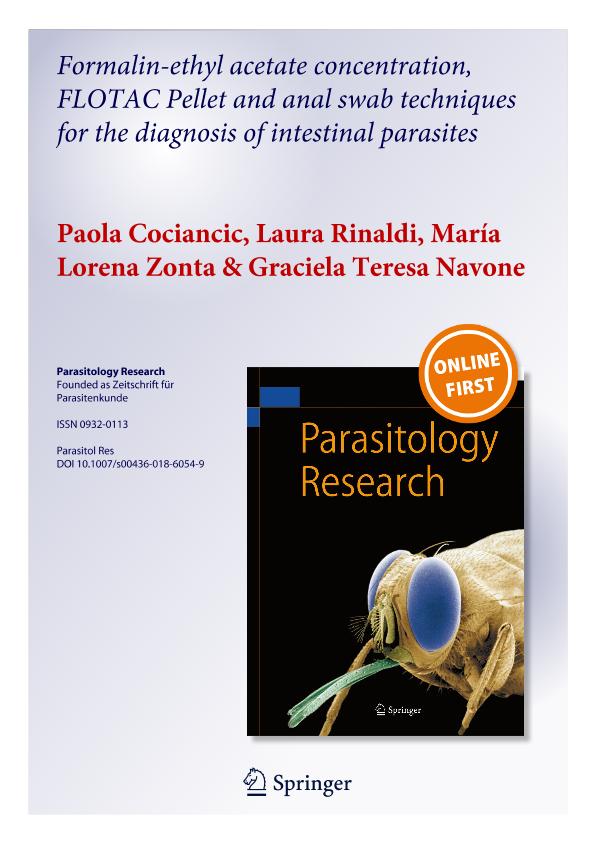Artículo
Formalin-ethyl acetate concentration, FLOTAC Pellet and anal swab techniques for the diagnosis of intestinal parasites
Fecha de publicación:
11/2018
Editorial:
Springer
Revista:
Parasitology Research
ISSN:
0932-0113
Idioma:
Inglés
Tipo de recurso:
Artículo publicado
Clasificación temática:
Resumen
The aim of this study was to compare formalin-ethyl acetate concentration and FLOTAC Pellet techniques for the diagnosis of intestinal parasites in human stool samples. The anal swab method was used for the specific detection of Enterobius vermicularis. The study was performed in children and youth from Puerto Madryn (South Argentina). A total of 174 individuals were examined using the formalin-ethyl acetate concentration technique (FECT), the FLOTAC Pellet technique with saturated sodium chloride and zinc sulphate flotation solutions and anal swabs. The performance of copromicroscopic techniques was evaluated according to sensitivity, negative predictive value and Kappa index. Overall, 39.1% of the individuals were parasitised. The most prevalent species was Blastocystis sp. (19%) followed by E. vermicularis (17.8%), Giardia lamblia (6.3%), Entamoeba coli (5.7%), Hymenolepis nana and Endolimax nana (1.1%). The FECT was the most sensitive technique for Blastocystis sp., G. lamblia and E. coli infections, whereas FLOTAC Pellet techniques were the most sensitive for H. nana diagnosis. Anal swabs detected the highest percentage of E. vermicularis infection. This was the first time that the FLOTAC Pellet technique was used to detect intestinal parasites in humans. The FECT continues to be a reliable method for detecting protozoa and the FLOTAC Pellet technique gains importance in the diagnosis of helminths. Anal swab test remains the method of choice for the detection of E. vermicularis. However, when comparing techniques, key factors as preservation methods, preservation times and flotation solutions should be taken into account.
Archivos asociados
Licencia
Identificadores
Colecciones
Articulos(CEPAVE)
Articulos de CENTRO DE EST.PARASITOL.Y DE VECTORES (I)
Articulos de CENTRO DE EST.PARASITOL.Y DE VECTORES (I)
Citación
Cociancic, Paola; Rinaldi, Laura; Zonta, Maria Lorena; Navone, Graciela Teresa; Formalin-ethyl acetate concentration, FLOTAC Pellet and anal swab techniques for the diagnosis of intestinal parasites; Springer; Parasitology Research; 117; 11; 11-2018; 3567-3573
Compartir
Altmétricas




